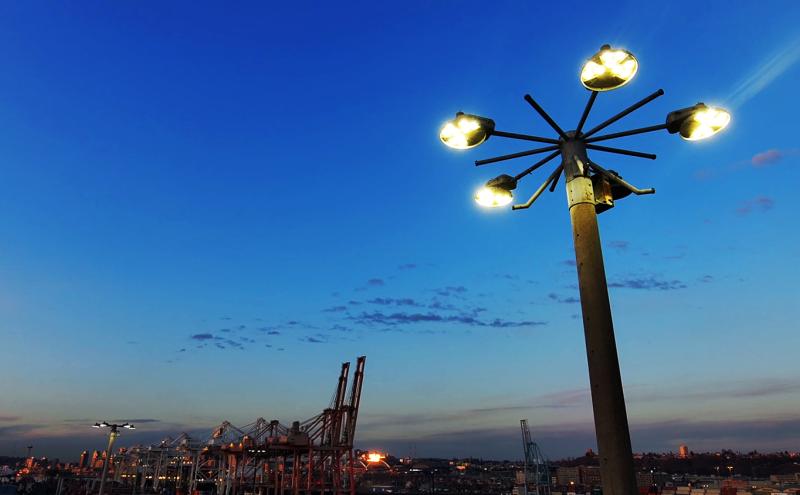
Things are looking a little brighter as the Port of Seattle upgrades all building lighting to high-efficiency LED (Light Emitting Diode) lamps, which will have positive environmental, financial, and health benefits for the Port and local communities. The LED Lighting Accelerator, started in 2022, was created to jumpstart the full transition, which the port aims to complete by 2030. The Accelerator includes expense funding to support lighting audits currently $4.5 million is committed in capital funding over four years to complete LED lighting retrofits across waterfront properties.
Why are LEDs such a big deal?
Lighting audits and retrofits support the Port’s Century Agenda goal to be the greenest and most energy-efficient port in North America by meeting all increased energy needs through conservation and renewable sources, and by reducing air pollutants and carbon emissions associated with generation of electricity. LEDs are a low-cost way to reduce energy use, utility costs, and reduce greenhouse gas emissions. They can also last 10 times longer than the lamps they replace, which represents a significant maintenance savings for the Port and its tenants.
High quality lighting is a health and safety strategy too, and good, reliable lighting indoors and outdoors reduces the chance of workplace incidents and injuries. LEDs have better light distribution, contrast, and color quality over their lifetime compared to other types of lamps, like fluorescent or incandescent. Changing bulbs itself can be dangerous, requiring the use of ladders and lifts, and exposing employees to electricity. Long LED life also reduces that risk (Source). LEDs are free from mercury, are considered non-toxic by law, and are the most environmentally responsible choice available (Source).
What was accomplished in 2022?
The first step in changing all fixtures from older more inefficient types of lighting to LED bulbs is to conduct audits that identify and mark light fixtures. The Port’s Marine Maintenance staff spent much of 2022 cataloguing the lamp and mount types, the number of lamps per fixture, wattage, pole number, and taking images across waterfront buildings and facilities. These audits inform replacement projects, energy estimates, and overall strategy, and provide reference information to electricians.
In 2022, Marine Maintenance staff completed 12 lighting audits at Fishermen’s Terminal, the Marine Maintenance South facility, Shilshole Bay Marina, Pier 66, and Terminal 91. To get the most energy savings, Marine Maintenance prioritized the most accessible fixtures like pole lights, exterior lights, Port-managed interior lights in common areas, and vacant tenant spaces.
Marine Maintenance completed three LED upgrade projects at Pier 66 to upgrade the south apron and pedestrian lights, the World Trade Center East Garage and access lights, and Fishermen’s Terminal’s dock and pole lighting. All projects included some level of controls, such as photocells, motion sensors, timers, or dimmers, which help the lights operate more efficiently. There are 2023 lighting audits planned for Salmon Bay Marina, Port-managed parks, and flyovers.
What’s the bright idea for 2023?
The Port is planning five LED retrofit projects for 2023:
- Terminal 91 pole lights
- Fishermen’s Terminal building exterior lighting (excluding building C-15)
- Net Shed 9’s interior space
- Pier 66 exterior
- Pier 66 International Promenade Room lighting and controls
Projects like this help the Port meet its aggressive environmental goals. LED lighting, while a small piece of the puzzle, is a critical step in saving energy, reducing cost, and ultimately creating a more sustainable future for the Port and the services it provides to the region.








